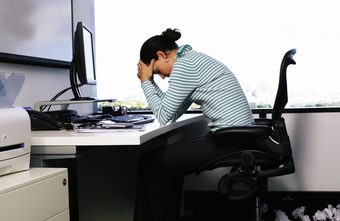Have you felt an energy slump or extreme exhaustion while at work? Have you found yourself sleeping often on duty? Fatigue at work is becoming a huge problem in today’s workplace. What’s responsible and what are the signs? Is there a way out of this challenge?
Workplace fatigue could be chronic or acute. Chronic fatigue arises as a result of sleep deprivation over a long period. Sleep debt can interfere with your productivity and daily activities. Acute fatigue could result from sleep debt for a short time.

Causes of Fatigue at Work
Several studies fingered sleep as one of the major causes of fatigue. According to the National Sleep Foundation, the majority of people in the United States get about or less than 20% of sleep than a century ago. This is due to personalised sleep deprivation.
In the same vein, the 2010 report of the Centre for Disease Control and Prevention revealed that 30% of U.S. workers sleep less than six hours a night.
One of the reasons for sleep debt could be stress and sleeplessness experienced by the majority of people. The Statistic Brain Research Institute revealed that about 48% of people reported that they most times lie awake at night as a result of stress.
Khosro and Zohreh (2015) believed that one of the major causes of workplace fatigue is inadequate restorative sleep. This can be brought about by other connected factors. Workload stress categorised into an environmental load, mental load and physical load, the authors reported, could induce fatigue in workers.
Signs of Workplace Fatigue
Signs of fatigue at work could be irritability, headaches, loss of appetite, low motivation, weakness and susceptibility to illness. One could also suffer reduced alertness, low concentration and memory, depression, etc.
Fatigue is a hazard and comes with costs. Fatigue leads to reduced alertness and the inability of workers to complete most of the assigned tasks. Industry experts believed that fatigue cost at least $77 billion every year.
The National Sleep Foundation reported that workplace fatigue cause injuries at work and 25% of highway accidents. In 2012, the foundation stated that 20% of pilots, train operators and 15% of truck drivers disclosed that sleep directly caused at least a serious accident in their careers.
The consequence of weakness at work vary according to the degree of weariness. It includes the inability to decide, plan, handle job-associated stress, forgetfulness, poor productivity, loss of memory, reduced attentiveness and response time, erroneous judgement, higher accident rates and medical costs.
Helpful Tips To Remedy Fatigue at Work
- Perfect Health
Make sure you are in perfect health. Fatigue could be a symptom of some diseases such as heart disease, sleep apnea, diabetes, anaemia, etc.
Some medications such as those for diuretics, blood pressure and antihistamines are capable of inducing fatigue. You need to be sure you are in perfect health. Rule out ill health as the major cause of your weakness. Once your state of health is good, examine other areas of your life causative factors.
2. Quality of Your Sleep
Quality sustainable sleep pattern is amazing for remarkable performance. Get enough and good sleep. Experts recommend getting to bed and waking up at the same time every day. Avoid excessive caffeine especially at night since they could cause insomnia.
Devise a means of relaxation, no matter your situation. Findings have shown that fretting over your challenges could cause insomnia. Explore and experiment with different relaxing techniques until you find one that suits you. If you must take sleeping pills, remember they are no long-term solutions for insomnia.
3. Get Active
One of the difficult things to do when you’re tired is to exercise. Studies have shown that physical activity enhances energy levels. Exercise has been reported to enhance strength, vigour and quality of life. The professor of medicine and director of clinical and research exercise physiology at the Johns Hopkins University School of Medicine, Kerry J. Stewart noted that active people have greater self-confidence and working efficiency of the internal organs since exercise provides the energy needed for any kind of activity.
4. Dehydrate and Maintain Regular Meals
Dehydration could cause weakness. A glass of water can help to revive your drooping energy, especially after exercise. Avoid skipping meals because this could dip your energy level. Regular meals are essential to maintain your energy level.
Avoid skipping breakfast. Food is the source of energy for the functioning of your body. Your brain depends on glucose for fuel. Healthy meals containing the right quantity of fruits, low-fat dairy, lean meats, wholegrain and vegetables, etc, are all you need for the right amount of energy. While a balanced meal is essential, avoid overeating because it could drain your energy.
5. Avoid Stress
Device every possible means to keep stress at bay. Manage your psyche and remain in charge. Studies suggest that between 50 to 80 per cent of fatigue is due to psychological factors. This is the reason you may opt for talking therapy if you think it’s necessary
In all, stress can drain your energy. Find ways to cut down on your stress levels. Head to the gym, meditate, do yoga exercises, listen to music, hang out with friends. Whatever you do, ensure to minimise your stress levels.
Where you notice your energy level declining or you observed a rising stress level, consider increasing the magnesium level in your body. You can do this by increasing the intake of magnesium-rich foods or by taking potent magnesium supplements.
Conclusion
The cost of workplace fatigue is huge. There are lots of techniques for changing the trend of your diminishing health and revamp your energy. The few options suggested above will help a great deal to get you started on the right journey.


